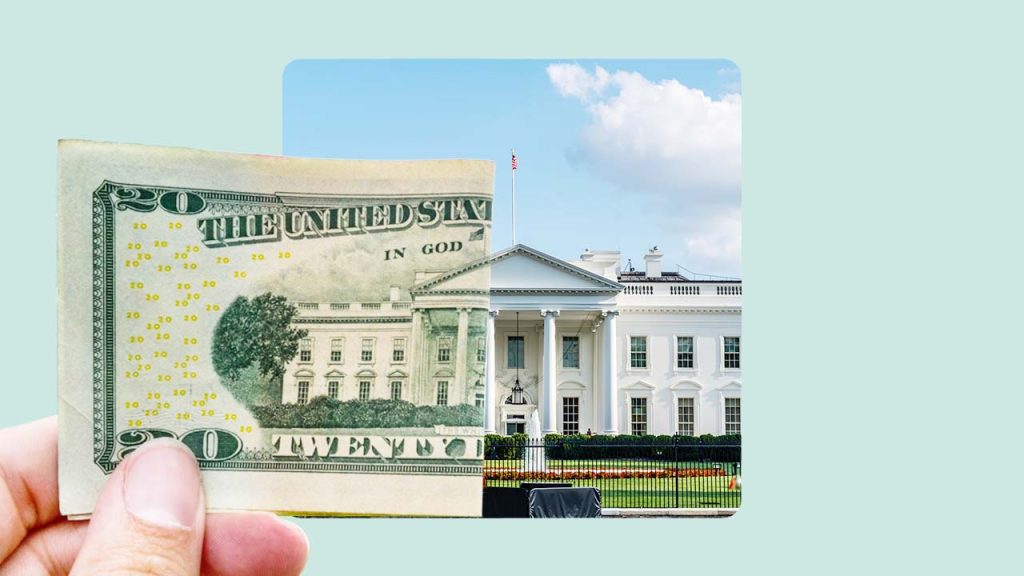Donald Trump will be assuming the office of U.S. president on Jan. 20, 2025, and his return to the role could usher in a wide variety of economic changes. Trump has promised to lower taxes, reduce inflation and raise tariffs on America’s key trading partners. While many of his plans lack concrete details or require congressional approval, they still leave many Americans uneasy.
But if they’re nervous about the prospect of Trump at the helm, Americans can take a number of steps themselves to protect their financial future, and they can start today — before Trump is even in office. These moves can insulate their finances from the potential negative effects of some of Trump’s proposed policies and even help them thrive in an uncertain environment.
Here are three money moves Americans can make before Trump takes office.
3 financial moves to make before Trump becomes president
1. Build up your emergency fund
On the campaign trail, Trump touted the virtues of tariffs as a way to raise revenue for the government and bring jobs to the U.S. Trump promised any number of approaches to tariffs, including a 25 percent tariff on Mexico and Canada, the largest trading partners of the U.S. He went further with China, America’s third-largest trading partner, threatening to hit the country with 60 percent tariffs and a bonus 10 percent tariff as an incentive to curb drug trafficking.
Despite Trump’s rhetoric about the benefits of tariffs, economists are in near consensus that tariffs will act like a further sales tax on Americans, raising the prices on goods. Moreover, some countries are already threatening to retaliate with tariffs on American products, a threat that would hurt sales of American exports. The net result would be less prosperity for Americans.
If tariffs are instituted broadly, inflation could come roaring back, and you’ll want to have the ready cash on hand to deal with the rising prices. So it’s critical to get your emergency fund in order now, by topping up your account or even adding a few extra months’ worth of savings. Experts recommend having at least three months of expenses in reserve, but six months is even better.
“Nothing helps you sleep better at night than having money tucked away for emergencies or other unplanned expenses,” says Greg McBride, CFA, Bankrate chief financial analyst. “Be sure to park this money in a high-yield savings account where the returns give you the best chance to preserve the buying power of that money.”
The best place for your emergency fund: a high-yield account at one of the top online banks. You can find the best rates in the country and can quickly move your money in and out. And if higher inflation doesn’t arrive, you’re not going to regret having more money down the road.
2. Get your retirement accounts funded
It’s nearing the end of the old year and the start of the new one, and that means it’s a great time to fortify your retirement accounts and secure your future. You can top off 2024’s IRA — you have until Tax Day in April to fund it — and then plan ahead for 2025’s IRA. It’s also a great time to plan for your employer-sponsored 401(k) account, too, finding the contribution that works for your budget.
Why the urgency? Social Security is staring down a fiscal shortfall in 2033 or so, say experts, and unless positive changes are made to the program soon, benefits could be cut by 25 percent. Even if you don’t rely on Social Security for your full retirement income — and you shouldn’t — it’s not too early to start saving for that rainy day to be sure you have enough money.
While Trump has said he wants to protect Social Security, he’s also said he’d be open to cuts. At least one of his proposals — to eliminate taxes on Social Security payments — would hasten the Social Security shortfall and put the program in serious jeopardy even sooner. So it’s unclear what Trump plans to do with the program, but with Republicans soon in charge of the executive and legislative branches, it is clear who’s calling the shots for at least the next two years.
In the last few years, prominent Republican legislators have proposed various plans to address the problem, typically through benefit cuts of some sort. For example, in March 2024, House Republicans offered a proposal to raise Social Security’s full retirement age from 67 to 69. The effect of this plan would be lower lifetime benefits for Americans, says the Congressional Budget Office, and it won’t change the year when Social Security would need to cut benefits anyway.
Nearly half (48 percent) of workers with a specific retirement goal in mind don’t think it’s likely they’ll be able to save as much as they’ll need to live comfortably, according to Bankrate’s most recent Retirement Savings Survey. So it’s vital that you plan for a reduced Social Security benefit starting now.
3. Protect your portfolio from inflation
Tariffs are one potential source of rising inflation in 2025, but Trump has made another promise that will likely lead to inflation as well. Trump is trying to push still more tax cuts. The government would continue operating at a significant — perhaps even larger — budget deficit and run up its national debt at a time when the debt is already at historic levels as a percentage of U.S. GDP.
The extra deficit spending could affect the economy in at least a couple ways. First, more money moving through the economy could lead to higher inflation. Second, the increased borrowings could raise interest rates, as investors demand compensation — higher interest rates — for a higher level of inflation and the increased riskiness of lending to a highly indebted country.
While inflation and higher interest rates may hurt stocks in the short term, well-positioned companies can push through cost increases to their customers, much as they did in 2021 and 2022, when inflation soared. The result is that companies continue growing their profits in an inflationary environment, and their stocks continue to rise as they push inflation on to customers.
For investors, it all means that investing in stocks remains an attractive long-term place to be.
“Stocks give you the best chance of not only maintaining your buying power, but growing it over time,” says McBride. “You’ll likely have to ride out short-term volatility from time to time, but patient and disciplined investors have been rewarded by holding a low-cost, broad-based stock market index fund over the long term.”
Investors can invest in the best American companies by buying shares in an index fund based on the S&P 500 index, a collection of hundreds of the top companies. The index has a strong record and has delivered returns of about 10 percent annually on average over the long term.
Plus, if Trump cuts corporate tax rates or provides other cost savings to businesses, it could lead companies to repurchase their own stock, putting further upward pressure on stock prices.
And if much higher inflation doesn’t arrive? Then stocks are probably an even better place to be.
Bottom line
Regardless of what economic changes occur under President-elect Trump, it’s important to be prepared. By taking a proactive stance ahead of time, Americans can safeguard their own financial security. And if the worst doesn’t happen, then they’re just that much better prepared.
Read the full article here
















